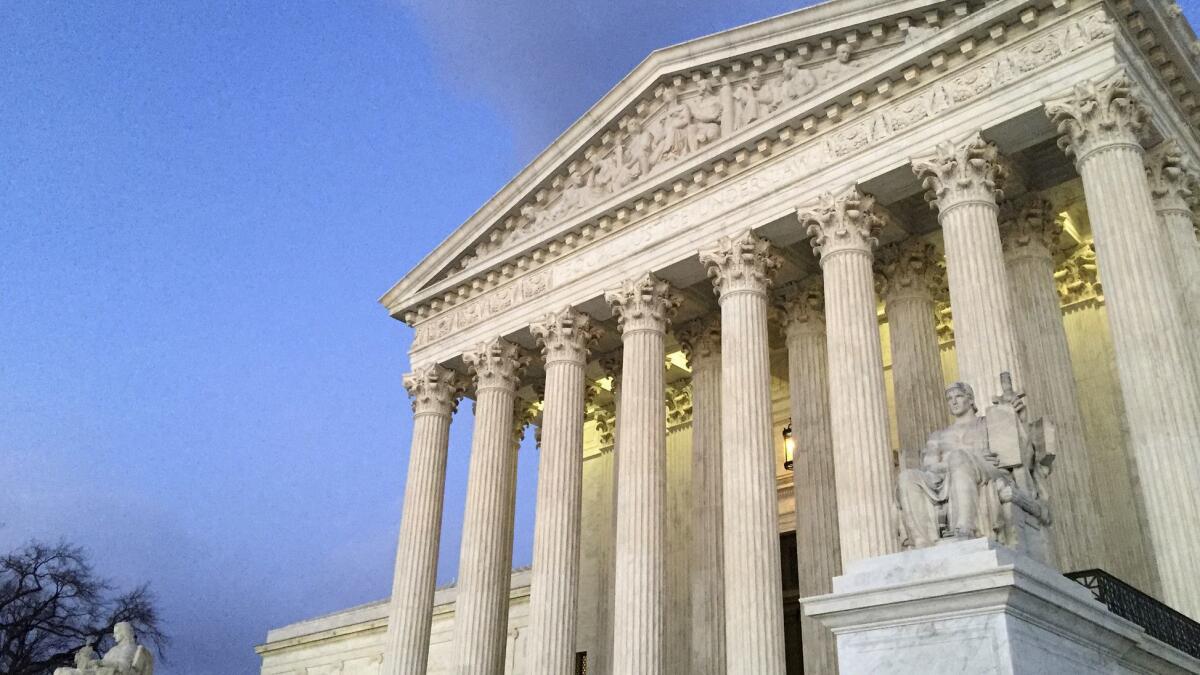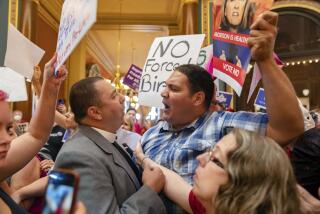Supreme Court blocks restrictive Louisiana abortion law by 5-4 vote as Roberts joins liberals

Reporting from Washington â The Supreme Court on Thursday temporarily blocked a Louisiana abortion regulation that was expected to close all but one or two of the abortion clinics in the state.
The case, June Medical Services vs. Gee, has been closely watched as an early test of whether the high court would stand behind its precedents in the area of abortion or begin to make it easier for states to restrict the procedure.
The decision came on 5-4 vote with Chief Justice John G. Roberts Jr. joining with the four liberals. It was the latest sign that Roberts does not want to move too quickly in shifting the court to the right, despite the recent addition of two appointees of President Trump.
The justices acted on an emergency appeal filed by abortion rights advocates who accused the conservative U.S. 5th Circuit Court of Appeals in New Orleans of upholding a regulatory law in Louisiana that was nearly identical to a Texas law that the high court struck down in 2016.
The justices agreed to put the law on hold while lawyers for the Center for Reproductive Rights prepare an appeal that seeks a review of the 5th Circuitâs ruling.
Three years ago, the Supreme Court struck down the Texas law that added new restrictions on abortion clinics and did so by a 5-3 vote with Justice Anthony M. Kennedy in the majority. The courtâs opinion said the Texas regulations were unconstitutional because they would not improve the quality of medical care and would sharply limit access to abortion for hundreds of thousands of women who lived outside a major urban area.
The decision in the Texas case was handed down a few months after Justice Antonin Scalia died. Dissenting then were Roberts and Justices Clarence Thomas and Samuel A. Alito Jr. Since then, they have been joined by Trumpâs two appointees, Justices Neil M. Gorsuch and Brett M. Kavanaugh.
Many have expected the new conservative majority to reconsider the past abortion decisions, including even the landmark Roe vs. Wade.
The key issue in the Louisiana case is a provision that requires every physician who performs abortions to have âactive admitting privileges at a hospitalâ within 30 miles.
A federal judge had blocked the Louisiana law after finding that only two of six abortion doctors said they were able to obtain the required admitting privilege. They said hospitals did not want to extend privileges to doctors who rarely sent patients for emergency care. They also said the hospitals acted out of fear of antiabortion protesters.
But last year, the 5th Circuit reversed the judgeâs ruling by a 2-1 vote and upheld the law.
Judge Jerry E. Smith, writing for the appeals court, said the situation in Louisiana was âremarkably differentâ than in Texas, and as a result, enforcing the admitting privilege rule would not have a significant effect on most women who seek an abortion. He agreed the rule would have only a âminimal benefitâ on the quality of healthcare. It would do so, he said, by ensuring that the doctors performing abortions were rated as qualified by a hospital and its doctors.
He concluded that because one or two clinics would remain in operation, the overall effect on women seeking an abortion would not be substantial. In his analysis, Smith said the blame rested with several of the abortion doctors for not trying harder to obtain credentials from a hospital in their area.
The ruling prompted unusually strong dissents from others on the 5th Circuit. Judge Patrick Higginbotham said the decision defied the high courtâs ruling in the Texas case. The Louisiana law was âenacted to frustrate a womanâs right to choose,â he wrote, adding it was impossible to âsee how a statute with no medical benefit that is likely to restrict access to abortion can be considered anything but âundueâ.â He referred to the Supreme Courtâs constitutional rule that states may not put âan undue burdenâ on women who choose to end a pregnancy.
The dissenters said the 2-1 ruling should be reconsidered by the full 5th Circuit, but that move failed on a 9-6 vote. The majority included four new Trump appointees.
Two weeks ago, lawyers for the Center for Reproductive Rights filed an emergency appeal asking the high court to again put the law on hold. âThe health, rights, and dignity of thousands of Louisiana women hang in the balance, along with the fate of the stateâs three remaining clinics,â they told the court in the case of June Medical Services vs. Gee.
Nancy Northup, the groupâs president, said the 5th Circuit had âbrazenly ignored recent U.S. Supreme Court precedent squarely on point.â
Late Thursday, she praised the high courtâs decision.
âThe Supreme Court has stepped in under the wire to protect the rights of Louisiana women,â Northup said. âThe three clinics left in Louisiana can stay open while we ask the Supreme Court to hear our case. This should be an easy case â all thatâs needed is a straightforward application of the courtâs own precedent.â
By blocking the law on a temporary basis, the court will keep the dispute on hold for months or perhaps more than a year. The justices will decide in the spring whether to hear the case, and it takes only four votes to grant a review. That means the court would probably not rule until the first part of next year.
Kavanaugh filed a dissent, arguing the law should not be blocked based on a prediction regarding its effects. He said the evidence suggested three or four abortion doctors would obtain admitting privileges. He was joined in dissent by Thomas, Alito and Gorsuch.
More stories from David G. Savage Âť
More to Read
Get the L.A. Times Politics newsletter
Deeply reported insights into legislation, politics and policy from Sacramento, Washington and beyond. In your inbox three times per week.
You may occasionally receive promotional content from the Los Angeles Times.











